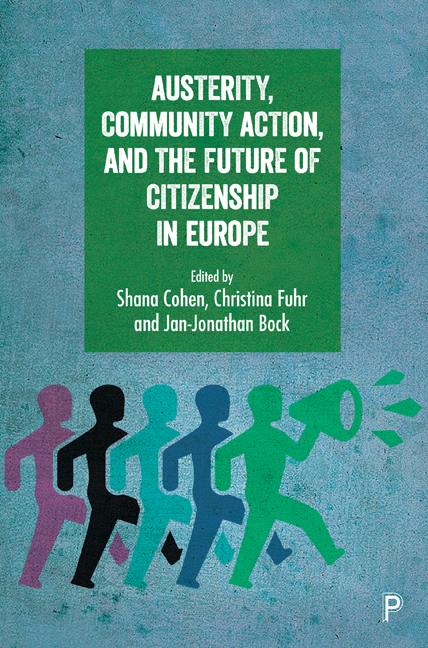Book contents
- Frontmatter
- Dedication
- Contents
- Acknowledgements
- Notes on contributors
- one Introduction: social activism, belonging and citizenship in a period of crisis
- Part I The social consequences of welfare policy
- Part II The practice of social good
- Part III Social change and neoliberalism
- Part IV Situating solidarity in perspective
- Index
Eleven - Social initiatives and social solidarity under austerity
Published online by Cambridge University Press: 05 April 2022
- Frontmatter
- Dedication
- Contents
- Acknowledgements
- Notes on contributors
- one Introduction: social activism, belonging and citizenship in a period of crisis
- Part I The social consequences of welfare policy
- Part II The practice of social good
- Part III Social change and neoliberalism
- Part IV Situating solidarity in perspective
- Index
Summary
The 2008 financial crisis resulted in a protracted recession in Europe of a kind not seen since the Great Depression (Colley, 1992). The United Kingdom's (UK) politics of austerity has led to dramatic cuts to social security and public services, and has been accompanied by falling incomes, a continual increase in living costs, growing unemployment and precarious employment (Oxfam, 2013; Slay and Penny, 2016). The combination has, in turn, contributed to a rise in poverty (Irving, 2013). In Germany, austerity-related labour market and welfare reforms were implemented between 2003 and 2005 as a continuation of the Sparpolitik (budget and austerity reduction) path. They were aimed at welfare readjustment to ensure international competitiveness and fiscal sustainability in a situation of high unemployment levels and repeated failure to stabilise and ensure economic growth. These policies continued and have worked effectively in Germany to limit negative economic impact in the aftermath of the 2008 financial crisis (Eichhorst and Hassel, 2015).
Austerity policies in both countries have increased the presence of and need for social initiatives such as foodbanks (Bunyan and Diamond, 2014; Forsey, 2014; Loopstra et al, 2015; Selke, 2015) and, with them, civic engagement (HM Government, 2013; Selke, 2013). In the media, foodbanks have largely been depicted as the epitome of social solidarity during austerity. The Oxford English dictionary (2016) defines solidarity as ‘unity or agreement of feeling or action, especially among individuals with a common interest; mutual support within a group’. Thus, solidarity is ‘a feeling of togetherness and willingness to take the consequences of that’ (Komter, 2004, pp 1-2). At present, however, it seems unclear to what extent foodbanks can create solidarity in society. The investigation of this topic is of societal relevance, since the economic crisis and the consequent call for austerity have contributed to the appearance of a new public concern over welfare abuse and a renewal of ‘anti-scrounger’ sentiment (Behr, 2010) across Europe (Romano, 2015). In the UK, a political narrative around the reinvigoration of the ‘benefit scrounger’ myth and of the notion of the ‘undeserving poor’ appeared post-2008 (Brianta et al, 2013). This trend has paralleled the political legitimisation of social policy reforms that reduced social entitlements and increased workfare incentives in many European countries (Ghimis et al, 2014).
- Type
- Chapter
- Information
- Austerity Community Action and the Future of Citizenship , pp. 171 - 196Publisher: Bristol University PressPrint publication year: 2017

